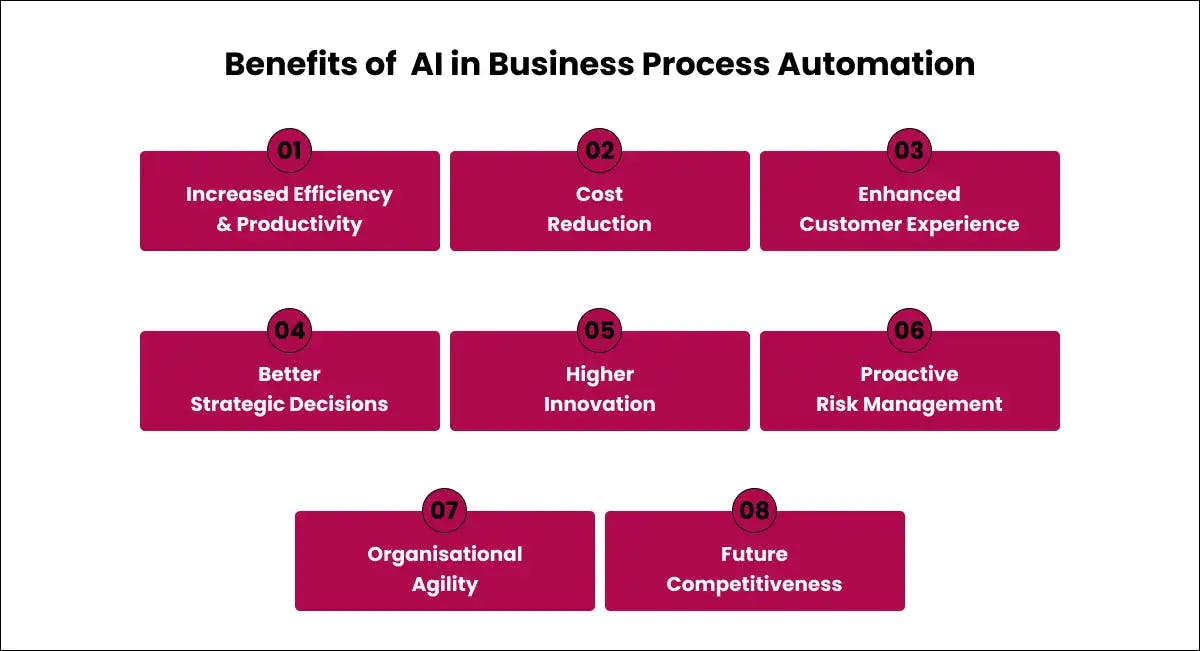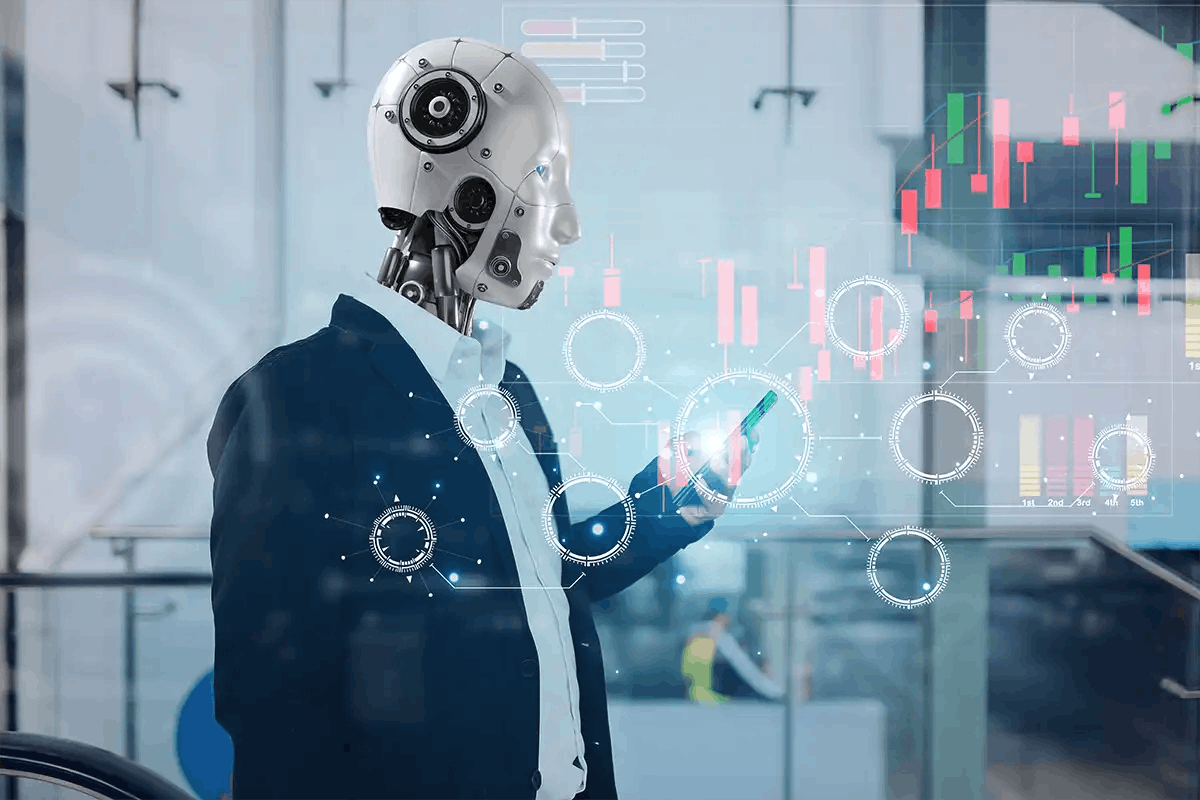
Is Business Process Automation possible with AI in 2024?
The future of Business Process Automation is undoubtedly possible with AI. Business processes in companies in 2024 greatly benefit from automation, allowing work to be done more quickly and effectively. Typically though, automated processes follow set steps and guidelines. This can limit flexibility. Adding artificial intelligence into processes in 2024 delivers an intelligent edge to businesses. AI in the business process gives automation adjustable options beyond pre-defined rules to take operations to a new level. Instead of just streamlining by set pathways, AI in the business process allows customising workflow suites to any situation. This brings opportunities for unprecedented increases in productivity and performance across all business functions. AI enhances automation with an adaptive, innovative approach for continuously improving how core activities are handled.

Through combining different areas of artificial intelligence like machine learning, natural language understanding, computer vision, and predictive analysis, jobs that were once boring and repetitive can now be done in more creative, flexible and optimised manners. AI in business processes allows automation systems to study examples, adapt to alterations, make judgments independently, and continuously better themselves.
Read this blog to find out how business process automation and AI signify a new phase of smart process automation that will change companies and industries.
Fundamentals of AI in Business Process Automation
Several key AI capabilities make it a game-changer for advancing business process automation:
- Machine Learning
This allows systems to learn from data and improve automatically over time without needing explicit programming. Machine learning models like random forests and neural networks identify patterns and enable smart decision-making capabilities. - Natural Language Processing (NLP)
Natural language processing allows computers to understand, interpret, and generate human language. It helps machines analyse written communication like documents, customer support queries, social media posts, and chat conversations. NLP powers applications that automate tasks involving human language across many areas. - Computer Vision
This automates the extraction of meaningful information from visual inputs like images, videos, and real-world camera feeds. It has diverse applications from manufacturing quality control to security monitoring and healthcare. - Robotic Process Automation (RPA)
Software bots that mimic human actions provide intelligent process automation by handling repetitive digital tasks efficiently. Integrated with AI, RPA becomes more versatile and adaptive. - Predictive Analytics
Identifying patterns and trends in historical data allows AI systems to make predictions regarding future outcomes and scenarios. This supports data-driven decisions and proactive process optimizations.
These emerging technologies enhance how businesses automate processes by providing abilities typically requiring human thought Accuracy, speed, and flexibility increase when new opportunities arise.
Artificial Intelligence and Business Process Automation can improve business operations and encourage innovation when used together successfully. While distinct in how they are used and what they can do, they overlap in some important ways:
1. Unified Goal
Both technologies aim to streamline processes, increase efficiency, and contribute to organisational competitivenes.
2. Automation Emphasis
- BPA: Automates repetitive, rule-driven tasks to improve operational efficiency and reduce costs.
- AI: Enables automation of complex processes requiring cognition, learning, and decision-making abilities.
- Similarity: Automation is a core principle for both, albeit at different complexity levels.
3. Data Dependency
- BPA: Utilises data to execute predefined functions and processes.
- AI: Uses data to learn, adapt, and make autonomous decisions.
- Similarity: Both rely on data, with BPA using it for process execution and AI for continuous learning.
4. Technological Integration
- BPA: Can be integrated with existing systems, augmenting functionality without radical transformation.
- AI: Offers similar integration possibilities, adapting to current technological developments.
- Similarity: Both can easily integrate with existing systems, enhancing efficiency and capabilities.
5. Scalability
- BPA: Enables easy scaling of operations by automating processes to handle increased workloads.
- AI: Equally scalable, AI can manage growing demands without significantly increasing human resources.
- Similarity: Both technologies support organisational growth by facilitating scalable operations.
6. Continuous Improvement
- BPA: Capable of constant refinement and optimization based on feedback and performance metrics.
- AI: Designed to evolve by learning from data and experiences, becoming progressively more intelligent.
- Similarity: AI and BPA are committed to ongoing improvement, although through different mechanisms.
7. Informed Decision-Making
- BPA: Offers real-time insights into business operations, aiding data-driven decisions.
- AI: Analyses extensive data sets to discern patterns and trends, providing valuable insights for strategic planning.
- Similarity: Both technologies contribute to better decision-making through data analysis and insight generation.
Real-World Impact of AI-Driven Business Process Automation
The convergence of AI and BPA is disrupting diverse industries by enhancing and automating key workflows:
1. Research and Development (R&D)
- Idea generation and innovation
AI algorithms analyse market trends, consumer behaviour, and competitive understanding to generate innovative product or service ideas. - R&D project management
AI automates tasks like scheduling, resource allocation, and progress tracking, ensuring efficient coordination among teams. - Market research and competitive analysis
AI collects and analyses market data, customer feedback, and competitor information, providing valuable insights for strategic decision making.
2. Recruitment and Human Resources (HR)
- Resume screening
AI streamlines the recruitment process by automating resume analysis against job requirements, ensuring an efficient and unbiased candidate selection. - Employee onboarding
AI-driven tools enhance the onboarding experience by providing essential information and addressing common queries, facilitating smoother integration of new hires. - Predictive analytics
AI assesses historical employee data to identify patterns and possible indicators of turnover, enabling proactive strategies for enhancing job satisfaction and retention.
3. Invoice Processing
- Data extraction and validation
BPA systems automatically extract relevant invoice information and validate data against predefined rules, minimizing errors. - Automated approval workflows
BPA tools implement predefined approval workflows, routing invoices through appropriate channels for approval, reducing delays. - Integration with ERP systems
BPA solutions smoothly integrate with Enterprise Resource Planning (ERP) systems, automatically updating financial records and ensuring data consistency.
4. Purchase Orders
- Automated data entry
BPA software automates data entry tasks, extracting relevant information from purchase orders and reducing manual input errors. - Integration with inventory management
BPA connects purchase orders to inventory management systems, automatically updating stock levels for optimal inventory control. - Vendor relationship management
BPA facilitates efficient communication with vendors, streamlining the procurement process and strengthening supplier relationships.
5. Expense Claims
- Efficient submission and approval
Automated workflows enable employees to submit electronic expense claims with receipts, accelerating the approval and reimbursement process. - Policy compliance and validation
BPA ensures adherence to expense policies by incorporating rule-based validations and flagging potential violations. - Real-time tracking and visibility
Automated systems provide real-time visibility into the status of expense claims for both employees and finance teams.
6. Sales and Marketing
- Automated price quoting
BPA solutions streamline the sales process by automating price quoting, ensuring rapid and accurate responses to customer inquiries. - Efficient approval processes
BPA tools facilitate quick approval processes within sales teams, reducing bottlenecks and accelerating deal closures. - Automated email marketing campaigns
BPA automates personalised email marketing campaigns, enhancing engagement and lead nurturing.
7. Customer Service
- Efficient query resolution with chatbots
AI-driven chatbots provide instant responses to frequently asked questions, improving customer satisfaction. - Enhanced customer engagement with virtual assistants
AI-powered virtual assistants offer personalised assistance, elevating the customer experience. - Sentiment analysis for customer feedback
AI-driven sentiment analysis interprets customer feedback, enabling data-driven improvements in products, services, or processes.
8. Finance and Accounting
- Automated expense processing
AI-driven expense management systems automate the entire expense process, from receipt submission to reimbursement, enhancing accuracy and compliance. - Efficient invoice processing
AI enables efficient invoice processing by extracting relevant information and automating approval workflows. - Anomaly detection
AI identifies anomalies in expense reports, allowing organisations to investigate and address possible issues promptly.
9. Operations and Supply Chain
- Demand forecasting
AI analyses historical data, patterns, and external factors to accurately predict future product demand, optimising inventory levels and improving customer satisfaction. - Inventory optimization
AI dynamically adjusts inventory levels based on production data, order patterns, and supplier lead times, minimising excess stock and stock outs. - Fleet management
AI-driven predictive maintenance enables proactive scheduling of vehicle maintenance, reducing unplanned repairs and optimising fleet efficiency.
10. IT and Cybersecurity
- Real-time threat detection
AI systems analyse network traffic, log files, and user behaviours to identify possible cyber security threats in real-time, allowing swift mitigation. - Behavioural analysis
AI establishes baselines for normal user activities and promptly identifies deviations that may indicate security threats. - Phishing incident response
AI swiftly identifies and responds to phishing attempts, blocking malicious emails and initiating investigation processes.
11. Legal
- Contract review
AI expedites contract review processes by systematically scanning legal documents for key terms, conditions, and possible issues. - Document automation
AI-powered document automation streamlines the creation of legal documents, generating drafts based on templates and minimising errors. - Due diligence in mergers and acquisitions
AI reviews extensive documentation to identify legal risks, accelerating the due diligence process in time sensitive transactions. - Contract lifecycle management
AI automates various stages of contract lifecycle management, from drafting to renewal, enhancing compliance and reducing contract disputes.
Key Benefits of Integrating AI in Business Process Automation
Some major benefits that enterprises can realise by strategically adopting AI for process automation include:

- Increased Efficiency and Productivity
Automating repetitive and mundane tasks through AI frees up human employees to focus on higher-value cognitive activities. Bots and intelligent assistants handle the bulk of the work leading to exponential productivity gains. - Cost Reduction
Reducing manual labour and errors through automation cuts operational costs substantially. Optimised use of resources enabled by AI also contributes to lower costs. - Enhanced Customer Experience
AI-driven automation enhances customer satisfaction through constant availability, quick query resolution, and personalised recommendations. This increases customer retention and loyalty. - Better Strategic Decisions
Analysing vast amounts of data to discern patterns, trends, and insights that would be impossible manually allows AI to support superior strategic decisions. - Higher Innovation
Generative AI can be used to generate creative ideas, scenarios, and prototypes to drive innovation in products, services, and business models. - Proactive Risk Management
Quickly detecting anomalies, predictive analytics and early warning systems powered by AI allow risks to be addressed proactively before materialising into issues. - Organisational Agility
The ability to rapidly adapt to changing conditions, customer needs and market dynamics provides a competitive edge. AI fosters this agility through real-time data processing. - Future Competitiveness
AI-driven automation future-proofs companies with capabilities that will only become more critical for sustaining a competitive edge going forward. Companies that lag in adoption will be left behind.
Implementing AI for Business Process Automation
While integrating AI and BPA promises manifold benefits, careful planning, and strategic implementation is key to exploring its full capability:
- Conduct process mining to identify automation opportunities based on the mix of repetitive and cognitive tasks.
- Evaluate relevant AI techniques including RPA, NLP, ML, computer vision, etc. based on specific process requirements.
- Ensure the availability of clean, good-quality training data to develop effective AI models.
- Start with a pilot project, measure results through defined KPIs, and then scale implementation.
- Continuously monitor model performance, retrain periodically, and maintain responsible AI practices.
- Focus on augmenting human employees through AI-human collaboration rather than full automation.
- Develop leadership understanding of the capabilities and limitations of AI systems to set expectations.
- Closely involve line-of-business teams in implementation through change management initiatives.
Conclusion
As research into AI continues to evolve, AI integration to automate business processes will steadily bring several new business opportunities. A solid plan using both human skills and AI can give businesses remarkable outcomes. Even though AI can't completely copy the way humans think, combining it with human intellect can enhance business tasks beyond what we could have thought.
Being a top AI development Company, Codiste specialises in business process automation. Codiste uses more than a decade of experience in delivering advanced AI solutions tailored to business needs. Our AI experts excels at building intricate frameworks and applications, with proficiency in AI-powered solutions. We stay up to date on the most recent regulatory and compliance requirements in key jurisdictions to ensure our solutions meet the highest standards.



AI vs. Human Marketers: Finding the Perf...
Know more
The Science Behind AI-Driven Customer Jo...
Know more
How AI Agents Automate & Optimize Your M...
Know more
